Boom town
The planet was actually called Woman Wept, because if you looked at it right from above, there’s like this huge continent, like all curved round. It sort of looked like a woman, you know, lamenting.
Boom town. One of my favorite episodes of Series 1. It seems so underrated! It is clearly a much calmer experience after the insane ride of The empty child and The Doctor dances, a bit closer in atmosphere to Father’s day, but even more, let’s say, quiet. It is most probably the cheapest of Series 1 in terms of actual money spent to produce it. It has very limited special effects (basically, the scene when the rift opens and Cardiff is shaken by the earthquake, and a couple moments of Margaret – erm, Blon Fel-Fotch – without her human skin). The only places we get to see are a few locations in contemporary Cardiff and the T.A.R.D.I.S. And apart from the mentioned earthquake scene (and a brief chase), almost everything that happens is people talking, talking, and talking. Based on this description, you could think that it must be a very boring episode! In reality, the tension is palpable, the stakes are high, and the impact – both on the heroes and the audience – is lasting. And let’s not forget the music! This might be the one episode of Series 1 with the best music – although to be fair, Father’s day also had a beautiful motive, and the Doctor’s theme first heard in Rose is absolutely stunning.
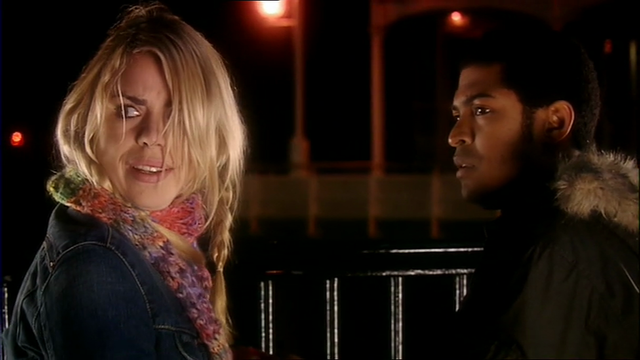
For most of the time, people just talk in Boom town – and that’s ok
Also, some of the topics appearing here are very interesting – even surprising. But let’s start with some obvious things.
Jack Harkness, captain of the Silly Fun Squad
I don’t have a lot to say about Captain Jack this time – well, Jack is Jack. Let me first mention that the scene in the beginning, when the Doctor, Rose and Jack explain the T.A.R.D.I.S. refuel process to Mickey, is so incredibly cheesy that it ends up actually great (with Mickey even making fun of them). It reinforces the idea that time travels with the Doctor are so much fun – the idea we all know is very incorrect – so that the contrast with this week’s pretty grim adventure is even more pronounced. (Interestingly, it seems the Doctor and his companions tend to have numerous exploits which are just that – fun – without all the burden of casualties and difficult moral choices. It just so happens that those are always off-screen. Another example of that that came to my mind immediately was spoiler for series 5Space Florida mentioned in spoiler for series 5The big bang – although to be fair, we only got a glimpse of an overexcited Eleven explaining spoiler for series 5how the “automatic sand” works to Amy Pond. Honestly, I wouldn’t mind a silly adventure when nobody dies and nobody is traumatized once in a while! On the other hand, it’s possible that the Doctor never has just silly and safe adventures, even if he tries… spoiler for series 7The party in 1890 when the Savoy Hotel was opened, when Eleven promised Amy and Rory “no complications” (in Power of three) is one of many examples of what can happen if the Doctor tries to have a “safe adventure”. Now that I think about it, my headcanon is that whenever the Doctor and his companion mention some fun time, they are just forgetting about the nasty parts. Here is a quote from spoiler for series 2The Christmas invasion which seems to confirm this:
– Well, I reckon you’re mad, the pair of you. It’s like you go looking for trouble.
– Trouble’s just the bits in-between. It’s all waiting out there […] And it is going to be fantastic!
My thoughts seem to be confirmed by the fact that Rose even mentions Gwyneth, and the next sentence she’s all laughing. I wonder if that was deliberate on the part of the writers. It felt off to me, very out of character for the famously compassionate Rose – but again, it emphasized the contrast between the careless mood of the protagonists in the beginning and the very serious moral dilemma they had to face a short time later.
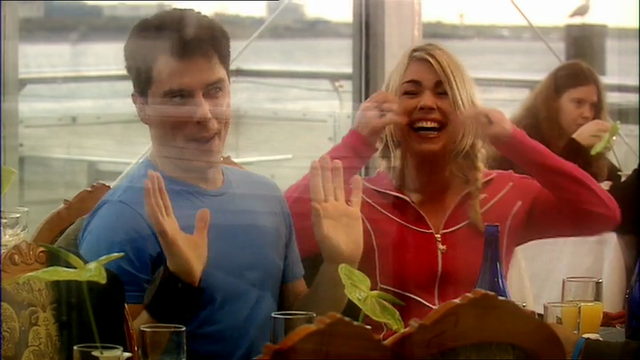
– State your name, rank and intention.
– Jack Harkness, Captain, fun.
Coming back to Jack, the second (and last) thing I’d like to point out that he calls the Doctor “sir”, and – surprisingly – the Doctor doesn’t seem to mind at all. The only explanation I can see is that the Doctor is still (a bit) jealous of Jack, and may even feel insecure in his presence. If that is the case, it is another powerful lesson for us: even the most tough and macho guys may be as fretting inside as anyone else. On the contrary, having order and peace inside is something that radiates in a difficult to describe way. There are people who project a certain air of calmness and confidence, making everyone feel safe – and at the same time, they are genuinely humble about it. Needless to say, the Doctor (however I like him!) is not one of them… While I know a few people like that in real life, I started to wonder if there are any examples in Doctor Who. I started thinking about it, and a few characters came into my mind as possible candidates. Brigadier Lethbridge-Stewart might be one of them, although I haven’t watched enough stories with him to be sure. A few people who sacrificed their lives for the Doctor’s cause seem to fit, at least a bit – Jabe, Gwyneth, spoiler for series 5Father Octavian from The time of angels and Flesh and stone, possibly spoiler for series 7Isaac from A town called Mercy. spoiler for series 8Perkins from Mummy on the Orient Express (who was actually one of the survivors of that story) might also qualify. The most surprising one (for reasons I cannot reveal now because spoilers!) example, however, may be actually… the Face of Boe!
Rose and Mickey
Now while I’m not a huge fan of Rose, I do like her a bit – but I have to admit that the way she acted in Boom town was very disappointing. I already mentioned how she mentioned poor Gwyneth and joked almost in the same sentence. Here, on learning that Blon Fel-Fotch is going to be executed, the first thing she says – with quite a bit of satisfaction! – is that the T.A.R.D.I.S. is going to be a real police box, with an actual prisoner. Say whatever you want, but that was just cruel.
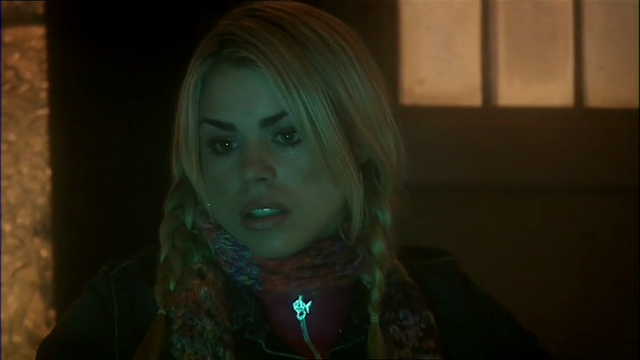
Woman wept, probably because of guilty conscience.
And of course the way she treated Mickey was just mean. Calling him to bring her the passport. Telling him about the visit to Woman Wept. (Am I the only one to think that the story about the ocean that got frozen must have been metaphorical? Also, that was precisely what happened at the very end of the episode – a woman wept…) Berating him for meeting with some other girl. Running away when the earthquake hit, not even looking at Mickey. Boom town is a moment when Rose started to drift towards the “unbearable” territory for me. On the other hand, this seems to be the next step for Mickey. We saw him act like a whimpering child in Rose, then he was more mature – with saving Jackie as his greatest moment – in World War Three. (His appearance in Father’s day doesn’t count, since he actually was a child then.) Now he tells Rose exactly what he wanted to say, and it’s neither easy nor nice. (That doesn’t mean I approve of his actions. It is hinted by Rose that he might have started dating Trisha Delaney only to spite Rose. If that was indeed the case – which we don’t know for sure, of course – it was very bad. How would poor Trisha feel if she knew Mickey didn’t really care for her but just wanted to make a point to Rose?) While Mickey is not my favorite character, I have to appreciate his story arc – spoiler for series 2and I really hope to talk about it more in a few months.
Blon Fel-Fotch and the Doctor
Now, of course the brightest star of the episode is Margaret Blaine, or Blon Fel-Fotch Passameer-Day Slitheen. Annette Badland’s performance was great, and even though there were still traces of the silly fun we remember from Aliens of London and World War Three (the “teleport chase” comes to mind!), the tone was much more serious this time.
The first sign that Blon stands out in the crowd of the usual enemies of the Doctor was her cute (and I think underrated) line on entering the T.A.R.D.I.S.: “How do you get the outside around the inside?”. Instead of gaping in amazement, she immediately recognizes that it’s, well, bigger on the inside, and gets technical. What’s even more interesting, she doesn’t ask how the Doctor fitted the huge inside in that small police box, but inverts the thing and asks about the outside instead. This may have been intentional on the part of the writers, as a very subtle way to point out to the Doctor that he considers himself the center of the universe – something that was also mentioned in Rose. Also, this means that when spoiler for series 7Clara says “It’s smaller on the outside” in Snowmen, Eleven was not entirely right when he quipped “Okay, that is a first”.
Probably the best scene with Blon is the dinner with the Doctor. It starts with all the shenanigans with her trying to kill him (which I find actually funny, even on the umpteenth rewatch), but it quickly escalates to a very serious discussion about the Doctor and how he’s not an innocent hero. To be fair, any comparison between Blon and the Doctor – and she works pretty hard to convince him that they are very much alike – must include the fact that the Doctor does not kill in self-interest. Still, he is a killer, and he is well aware of that. Of course, even if the words “I only kill when necessary” are not outright spoken, they can be felt, and of course, it’s a legitimate question to ask if that is morally justified. That’s a tough question. While it is obvious to me that killing a person may be justified (self-defense is an obvious example), it is far less obvious to me if it may be necessary. Maybe it’s the case that there is always a better way than to kill someone? I won’t even try to answer that question, but I think it is a very good mindset. Too often we are content with saying that some action (not necessarily as violent as killing) is acceptable, but maybe we should be asking another question – what action is the best one, or at least a better one? Just some food for thought, and (hopefully) not only something to think about, but also something to apply in the real life.
Let me also mention a very sad moment. When Blon tells the Doctor how she spared Cathy, the journalist, she outright admits that she can’t prove it. The Doctor calmly says that he believes her. Nevertheless, when she pleads with him a couple of moments earlier, and begs for a chance, claiming that she can change, this time he outright states that he doesn’t believe that. I find it almost depressing. I am a firm believer in change – I believe (even more, I know!) that people can change their ways. I don’t claim it’s easy, I don’t claim it always succeeds, and I don’t claim you can do it on your own – but I know for a fact that it’s possible. And also the Doctor, having seen a bunch of people repent and mend their mistakes, should know that. In the end, he seems to change his mind – Blon is regressed to an egg, and instead of throwing the egg into the nearest supernova, he decides to give her a second chance anyway. (The question whether the newly born Blon will retain her memories is an open one, although I would guess that not, she’ll start with a blank slate.)
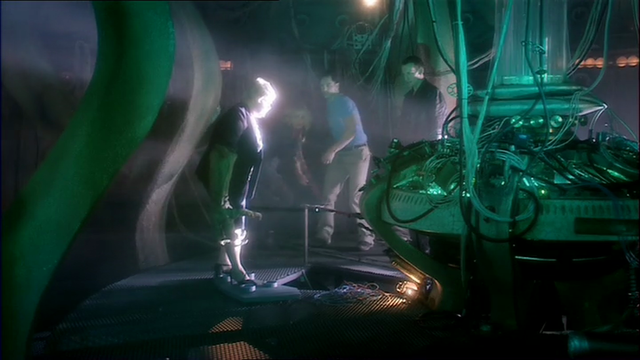
Mesa clumsy…
Let me finish the section about Blon with a quick mention that seeing her with one Slitheen hand outside the suit was hilarious, despite all the gravity spoiler for series 14(or is it mavity?) of the moral choices in the episode.
Capital punishment
Any serious discussion about Boom town would be incomplete without mentioning that it is one big commentary on the issue of death penalty. I think the reception of this topic heavily depends on where and when you watch it. I don’t know about early-21-century Great Britain, but as of 2023, in my country the death penalty is no longer carried out (or even present in the penal law), and the last execution happened over 35 years ago.
That said, I am not (in principle) opposed to capital punishment. I consider it very similar to killing in self-defence: not something I’d like to see happen, but sometimes acceptable as a way of defending a greater good. One example I like to use is a boss of a powerful criminal organization – powerful enough that it is practically guaranteed that he’ll lead it even from prison (or that he’ll escape with ease). If imprisonment is not enough to protect the society from him, than killing him may be the only way to do that.
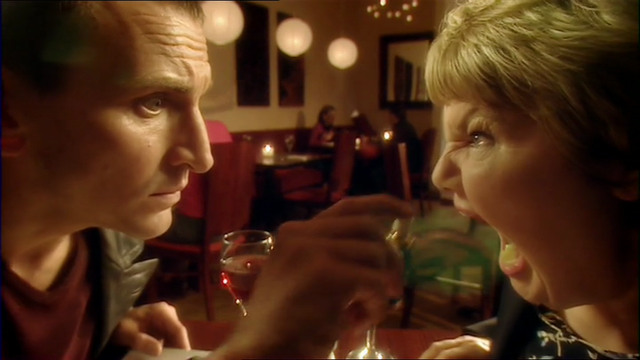
Should bad breath be punished by death?
Of course, while this sounds good in theory, there are also practical considerations. One of them is the problem of mistakes. Judges are people, and even with quite a few safeguards built in the legal system, it is almost certain that mistakes will happen and innocent people will be convicted. Definitely not a pleasant thought… (Although one might argue that much like we accept the possibility of a surgeon making a mistake resulting in someone’s death, perhaps we should accept the possibility of a judge making a mistake and convicting an innocent person – even to death. To be honest, I can’t really decide if this is a valid argument. Good thing is that I don’t have to – I’m not a lawmaker.) Another issue is the problem which (it seems) is not mentioned very often – who the executioner is going to be? If we decide to convict people (even very rarely) to death, then someone has to pull the trigger. I really wouldn’t like to inflict such a duty on anyone. (Now that I think of it, a very similar issue applies to the judge.) Interestingly, this exact problem lies in the center of Boom town. It is one thing to argue that death penalty should be reinstated in general or even carried out in a particular case, but completely another to agree to be the one who presses the proverbial red button… (On the other hand, similar objections could be raised in the case of the army or the police, and I don’t think anyone seriously claims we should resign from having them, so I don’t think this particular argument is very strong. Again, don’t count on an answer from me here and now, but there you have some food for thought…) Yet another potential problem is that for many people, death penalty is sort of “revenge” on an especially cruel criminal – which completely misses the point (protection from someone so dangerous we cannot contain him in another way), and morally taints people demanding such a “revenge”.
Having written all this, the conclusion seems pretty clear to me. Even if death penalty as such is morally acceptable (in certain circumstances), it is definitely a good thing to avoid it whenever we can. This seems to be in line with the law in my country, which for many years had death penalty, but it was strongly discouraged and almost never used – and then (some 25 years ago) it was removed from the law altogether.
Other tidbits
As usual, there are a few things I’d like to mention without spending too much time on them. And the first thing is what Cathy says about her boyfriend: “He’s nothing exciting, but he’s mine”. I find it really sweet. Yet another reminder that you don’t have to be “exciting” – a hero, someone beautiful or rich, or even an “ideal” person – to be able to love and be loved.
Also, a shout-out to Margaret’s secretary, who not only managed to drop the show title (“– Doctor Who? – Just the Doctor”), but etched himself on my memory forever even though his scene was maybe a minute long.
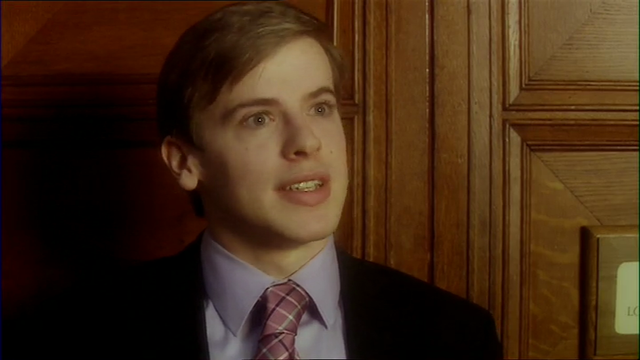
– She’s climbing out of the window, isn’t she?
– Yes, she is.
I already mentioned how the Doctor allows Jack to call him “sir” – but I didn’t mention how he scolded Jack for attempting to take charge and then just accepted Jack’s plan. That was comedy gold! (That scene, by the way, was probably not a bad lesson on leadership!)
The Doctor first being a little bit freaked out because of (yet another) appearance of the mysterious “Bad Wolf” phrase and then quickly dismissing it since he saw how it scared Rose was another cute little moment – even though (as I mentioned earlier) I do not approve of the fact that he seemed to lie to her.
In case you somehow managed to miss all the little (and not so little) hints that the Doctor has a less-than-nice side to him, seeing him invite Blon to a dinner – perhaps the last in her life – with a wide but extremely unsettling grin should be enough to convince you this is not someone to mess with.
Finally, let me mention two sad but important moments. One was when the Doctor was sitting with Rose, Jack and Mickey in a restaurant, telling jokes and laughing. Then he sees Margaret’s face in the newspaper, and says in a very disappointed tone: “And I was having such a nice day”…
Even sadder moment was very near the end, when the Doctor cheerfully exclaims, “Off we go, then. Always moving on” – doing exactly what Blon accused him of not a very long time ago. Not only didn’t he believe that Blon could change, he himself failed to change!
Last but not least
One thing that draws me to Doctor Who is how the Doctor respects every person and every form of life. He may be a killer, but he doesn’t kill on a whim – and he usually does what he can to give his enemies a chance of surviving. (Most of them are not wise enough to use it, though.)
Boom town is probably the first episode in New Who where this respect for life is so visible. One aspect of this is the discussion of death penalty and the fact that the Doctor seemed really happy that Blon survived after all. But the most surprising – and touching – is the respect the writers give to forms of life in its earliest stages.
Near the end of the episode, when they discuss what to do with Blon in the egg form. For many people, an egg is just this – an egg, a thing. But for the Doctor, Rose and Jack, this egg is a she, Blon Fel-Fotch Passameer-Day Slitheen. Compare this with Mickey, who didn’t consider Blon – even in an adult form – a person (“she’s not even a she, she’s a thing”). We already discussed how many people in history – and even nowadays – were and are considered not-people. It fills me with joy to see the three characters – a war veteran, a young girl and a con man – treating Blon in her egg form as the same person they watched mere second earlier.
But there’s more. When – of all people! – Blon herself speaks with Cathy and realizes she’s pregnant, the question she asks is very telling: “you're with child?”… To which Cathy responds that it’s “three months [old]. It's not showing yet”. It is a beautiful acknowledgment to the fact that this tiny youngling is nothing else but a child, a little human being, deserving respect and protection. For me, this is much what Doctor Who is about, and this episode is a perfect example.
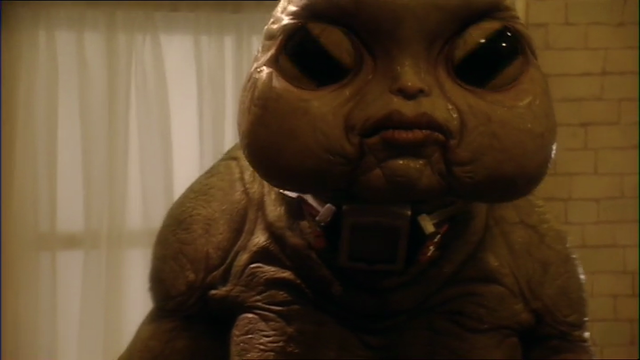
You’re with child…?